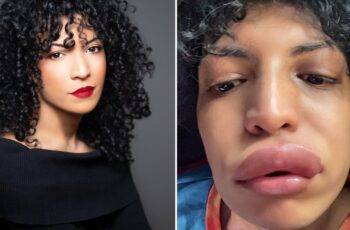Generally, a person does not react to a specific allergen the first time they’re exposed because their cells are not yet “sensitized” to it, Sporter said. Instead, their body responds by producing special antibodies called IgE.
The next time they’re exposed to the same allergen, these IgE antibodies become activated and trigger the immune system’s mast cells to dump histamine and other chemicals into the bloodstream, which makes them feel itchy, sneezy, etc., Sporter said. It’s a speedy process that usually occurs within seconds to minutes.
Taking antihistamines, like Benadryl, can help stop the reaction, although as we said, an epinephrine injection is needed for people with life-threatening reactions.
The most serious way to experience a reaction is to eat whatever you’re allergic to, but touching it can also elicit a response, like an itchy rash. This can happen directly, for example, if someone who is allergic to eggs touches egg yolk that dropped on the kitchen counter, or indirectly, when a parent who just ate peanut butter kisses their allergic toddler on the cheek.
Exposure to an airborne allergen, like when passengers open peanut packets in airplanes or when someone is boiling shellfish, is possible too. (Many airlines stopped serving peanuts during flights for this reason.)
“On the other hand, passionate kissing with exchange of saliva could be similar to actually eating the food,” Dr. Scott Sicherer, chief of the pediatrics allergy and immunology division at Mount Sinai, told BuzzFeed News in an email. “The consequences would depend on the amount of the allergen in the saliva of the person who ate the food, how much was transferred to the person with the allergy, and how sensitive the person with the allergy is to the allergen.”
Sicherer and colleagues conducted a study involving people without a peanut allergy and confirmed that peanut proteins were plentiful in those who ate a peanut butter sandwich, but the amount varied from person to person.
Turned out that brushing, rinsing, chewing gum, and simply waiting for over an hour after eating the peanut butter sandwich “resulted in there being little to no remaining peanut allergen in the saliva but it was not 100% gone for some,” Sicherer said. If people waited a few hours and then ate more food (without the allergen), the peanut protein was eliminated.
Experts recommend you discuss your allergies with your partner or anyone else who may be cooking for you or sharing your food, as well as anyone you plan to share saliva or other bodily fluids with. You also might as well clean your mouth as thoroughly as possible before kissing others because it could help.
It’s also never OK to intentionally consume or interact with your allergen just because you know you can take an antihistamine shortly before or afterward, Sporter said. Allergies come and go on their own terms, so it’s best to avoid known allergens altogether or visit a doctor to get the appropriate testing done.
As for Gonzalez, it took two full days for her lip to return to its normal size. The experience, she said, was “definitely eye-opening” and truly makes her wonder whether it’s a question worth asking before hooking up with new people.
“Like is this a new thing on my list?” Gonzalez said. “‘Hey, are you STD-free, and also have you eaten shrimp?’”
Source: https://www.buzzfeed.com/katiecamero/kissing-leads-to-swollen-lips-shellfish-allergy
